If you've ever thought that, why do some blog posts rank better on Google than others, even targeting the same main keyword?
The strategy is Semantic Keywords.
In this guide, we will look into what are semantic keywords, how they help your content rank better, and the exact steps to find and use them.
Whether you're a beginner in SEO or a content creator, or a website owner looking to level up, this blog will give you everything you need to know simply and practically.
What are Semantic Keywords?
Semantic keywords are terms or phrases that are closely related to your primary keyword. They don’t have to be exact matches, but are contextually connected.
For example, if your main keyword is “digital marketing,” semantic keywords could be:
- online advertising
- SEO
- Content strategy
- Social media marketing
Why are semantic keywords important?
Because Google isn’t just matching keywords anymore. It’s understanding the meaning behind the words.
Using semantic keywords helps search engines understand your content better, and it is the most effective way to rank and compete with your competitors.
How Semantic Keywords will Improve your SEO?
When you include semantic keywords in your content, it becomes more relevant.
It not only answers the exact keyword but also answers a broader set of users' questions about the topic that you have covered.
For example, a blog about 'Semrush Tutorial', that also mentions Semrush keyword research, Semrush competitive research, and Semrush position tracking guides.
It is more helpful for readers to find relevant information, and it has a higher chance of ranking.
In fact, people don't always search in the same way.
One person might search 'Semrush free trial', and the other person might search 'How to activate Semrush free trial'.
So, using semantic keywords helps your content connect with different search phrases with the same search intent, and you will rank for multiple keywords from a single blog.
Repeating the exact keywords 15 times was gone.
Now, use a semantic keyword strategy to name your content so that it sounds natural, while still helping search engines understand what your blog is about.
Because Google uses NLP(Natural Language Processing) to analyze the semantic keywords.
How to Find Semantic Keywords?
Let's explore the best ways to find them using SEO tools.
Use Semrush SEO Content Template
Once you find your primary(main) keyword, enter it on the Semrush SEO Content Template.
Select the country you want to target and click 'Create Content Template'.
Semrush will analyze the top 10 pages ranking for your keyword
For instance, I typed "SEO" in the box, and the keywords I got are below.

This helps you write content that's not only optimized for SEO but also aligned with what is already working in search results.
Also note that this feature is available on the Semrush Guru Plan with a limited-time offer.
To access this feature, you need a Semrush subscription. To save money, here is a Semrush coupon that offers a discount. You can also try the Semrush free trial before purchasing and use the tools at no cost.
Find Semantic Keywords using Google Suggestions
One of the simplest ways to find the semantic keywords is to use Google.
Google will display the keywords that people are searching for differently, along with related content.
1. Autocomplete suggestions
Type the keyword in the Google Search box.
For example, let me type 'free keyword research tools'. It provides me with keywords or phrases relevant to my query, as shown in the image below.
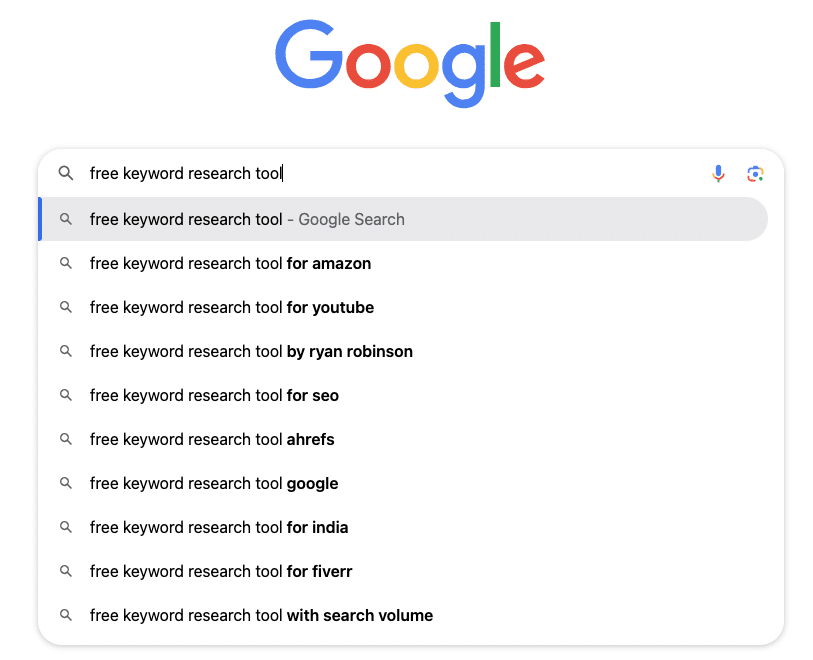
2. People Also Ask
This section of the SERPs(Search Engine Result Pages) will provide semantic questions related to your search query.
This means people frequently search for these questions to find the answers or results.

3. People Also Search For
You will find the 'People also search for' section at the end of SERPs.
From here, you will get the idea related to your search. Make use of it as well.
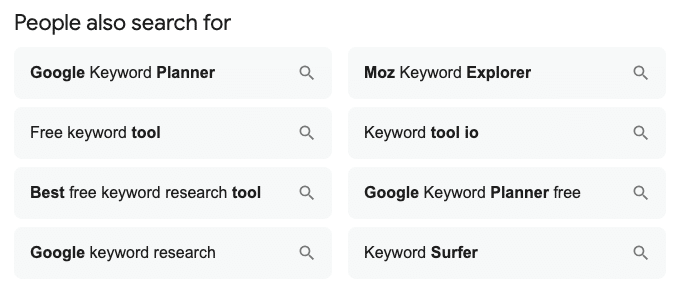
Use Google Trends
Google Trends(Glimpse) is another way to find related topics and queries, which you can use as semantic keywords.
Enter the keyword that you want to know about its trends, related terms, and more. (I typed as 'Semrush')
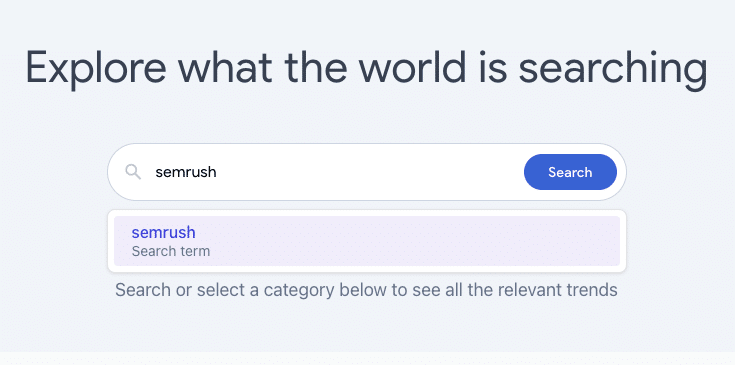
Use this filter to find a specific country and time. You can also choose a category.
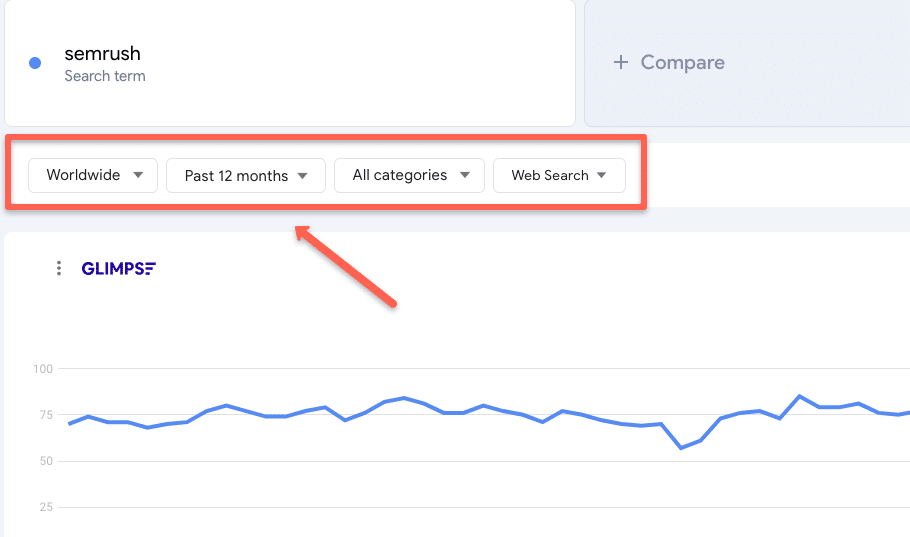
Scroll down to the 'People also search' section.
Here, you find the keywords related to your search query, which will be very helpful if you use them as semantic keywords.

Again, scroll down to 'Related Topics', and the 'Related Queries' section.
Here, you will find the top and rising queries related to your keyword. You can use this as a semantic keyword or create a new blog from it.
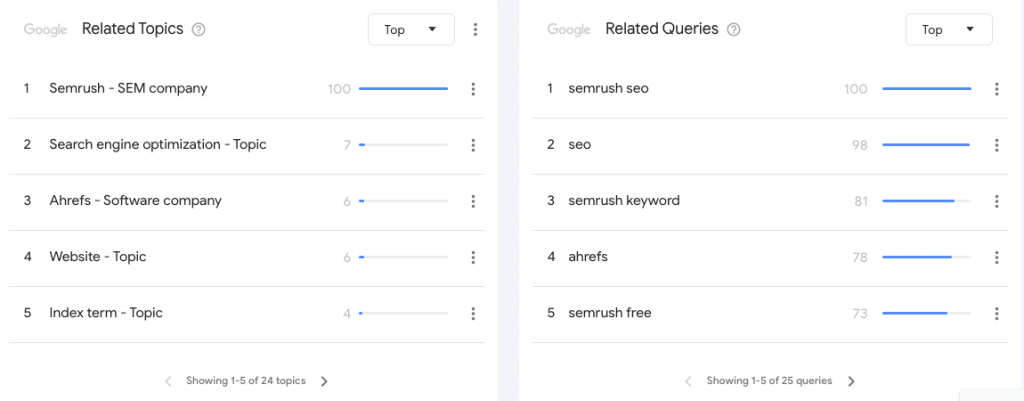
Other Keyword Research Tools
These are the other keyword research tools used to find semantic keywords.
Those are the few tools I know. You can find other tools on Google.
Conclusion
Semantic keywords can help you build content that is helpful to readers and search engines, match user intent, and improve your chances of ranking higher on Google.
Instead of focusing on the same keyword, try to focus on the full topic.
I hope you now have a clear picture of what semantic keywords are and how to find them.
If you have any doubts regarding this topic, drop them in the comments.
I'm happy to help!

